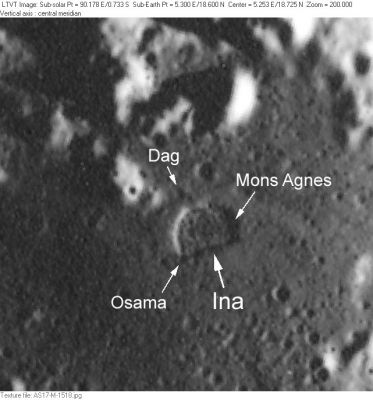Difference between revisions of "Mons Agnes"
(Created page with "<div id="content_view" class="wiki" style="display: block"> =Mons Agnes (in Ina caldera)= {| class="wiki_table" | Lat: 18.6°N, Long: 5.3°E, Diam: 0 km, Height: km, [/R%C...") |
|||
| (3 intermediate revisions by the same user not shown) | |||
| Line 3: | Line 3: | ||
{| class="wiki_table" | {| class="wiki_table" | ||
| | | | ||
| − | Lat: 18.6°N, Long: 5.3°E, Diam: 0 km, Height: km, [ | + | Lat: 18.6°N, Long: 5.3°E, Diam: 0 km, Height: km, [[R%C3%BCkl%2022|Rükl 22]]<br /> |
|} | |} | ||
<div id="toc"> | <div id="toc"> | ||
| − | + | [http://www.lpod.org/coppermine/albums/userpics/Ina_AS17-M-1518_LTVT.JPG [[Image:Normal_Ina_AS17-M-1518_LTVT.JPG|external image normal_Ina_AS17-M-1518_LTVT.JPG]]]<br /> ''[http://lpod.org/coppermine/displayimage.php?pos=-2420 AS17-M-1518]'' Mons Agnes is a vaguely defined rise on the floor of the [[Ina|Ina]] caldera. According to the Topophotomap it is at most 30 m tall. The white arrow points to its purported position very close to the east rim, although no indication of a raised feature can be seen at that position in this lower sun view. Besides [[Ina|Ina]], the other IAU-named features in this field are [[Osama|Osama]] and [[Dag|Dag]].<br /> <br /> | |
| − | |||
==Images== | ==Images== | ||
[http://www.lpod.org/coppermine/thumbnails.php?album=search&type=full&search=Mons%20Agnes LPOD Photo Gallery] [http://www.lpi.usra.edu/resources/lunar_orbiter/bin/srch_nam.shtml?Dag%7C0 Lunar Orbiter Images] [http://www.lpi.usra.edu/resources/apollo/search/feature/?feature=Manilius Apollo Images]<br /> <br /> | [http://www.lpod.org/coppermine/thumbnails.php?album=search&type=full&search=Mons%20Agnes LPOD Photo Gallery] [http://www.lpi.usra.edu/resources/lunar_orbiter/bin/srch_nam.shtml?Dag%7C0 Lunar Orbiter Images] [http://www.lpi.usra.edu/resources/apollo/search/feature/?feature=Manilius Apollo Images]<br /> <br /> | ||
==Maps== | ==Maps== | ||
| − | ''([ | + | ''([[LAC%20zone|LAC zone]] 41C3)'' [http://www.lpi.usra.edu/resources/mapcatalog/LAC/lac41/ LAC map] [http://www.lpi.usra.edu/resources/mapcatalog/usgs/I463/ Geologic map] [http://www.lpi.usra.edu/resources/mapcatalog/LM/lm41/ LM map] [http://www.lpi.usra.edu/resources/mapcatalog/LTO/lto41c3_2/ LTO map] [http://www.lpi.usra.edu/resources/mapcatalog/topophoto/41C3S1/ Topophotomap]<br /> <br /> |
==Description== | ==Description== | ||
| − | It is unclear from the Topophotomap if Mons Agnes is a thought to be a dome-shaped rise on the floor or an inward extension of the east rim of [ | + | It is unclear from the Topophotomap if Mons Agnes is a thought to be a dome-shaped rise on the floor or an inward extension of the east rim of [[Ina|Ina]]. The high resolution versions of the Apollo images show more of a depression than a rise at this position. Possibly Mons Agnes is meant to be the ridge between two of these depressions (with which the floor of [[Ina|Ina]] is scalloped. <span class="membersnap">- Jim Mosher</span><br /> <br /> |
===Wikipedia=== | ===Wikipedia=== | ||
[http://en.wikipedia.org/wiki/Mons_Agnes Mons Agnes]<br /> <br /> | [http://en.wikipedia.org/wiki/Mons_Agnes Mons Agnes]<br /> <br /> | ||
==Additional Information== | ==Additional Information== | ||
* IAU page: [http://planetarynames.wr.usgs.gov/Feature/3970 Mons Agnes] | * IAU page: [http://planetarynames.wr.usgs.gov/Feature/3970 Mons Agnes] | ||
| − | * For examples of Apollo photos of [ | + | * For examples of Apollo photos of [[Ina|Ina]] (and Mons Agnes?) at much higher resolution see the freely available article by G. J. Taylor (2006) which includes some of the startlingly clear images from the article in ''Nature'' by Schultz, Staid and Pieters (2006). |
<br /> | <br /> | ||
==Nomenclature== | ==Nomenclature== | ||
* Greek female name. | * Greek female name. | ||
| − | * According to [ | + | * According to [[NASA%20RP-1097|NASA RP-1097]], "Mons Agnes" is a [[Minor%20Feature|Minor Feature]] whose name was originally intended only for use in connection with [http://www.lpi.usra.edu/resources/mapcatalog/topophoto/41C3S1/ Topophotomap 41C3/S1](on which it is plotted). |
<br /> | <br /> | ||
==LPOD Articles== | ==LPOD Articles== | ||
| − | See at page [http://the-moon. | + | See at page [http://the-moon.us/wiki/Ina Ina]<br /> <br /> |
==Bibliography== | ==Bibliography== | ||
| Line 33: | Line 32: | ||
<br /> <br /> | <br /> <br /> | ||
---- | ---- | ||
| − | [ | + | [[Alphabetical%20Index|Named Features]] -- Prev: [[Rima%20Agatharchides|Rima Agatharchides]] -- Next: [[Montes%20Agricola|Montes Agricola]]<br /> |
---- | ---- | ||
| − | + | </div> | |
Latest revision as of 20:44, 15 April 2018
Contents
Mons Agnes (in Ina caldera)
|
Lat: 18.6°N, Long: 5.3°E, Diam: 0 km, Height: km, Rükl 22 |
AS17-M-1518 Mons Agnes is a vaguely defined rise on the floor of the Ina caldera. According to the Topophotomap it is at most 30 m tall. The white arrow points to its purported position very close to the east rim, although no indication of a raised feature can be seen at that position in this lower sun view. Besides Ina, the other IAU-named features in this field are Osama and Dag.
Images
LPOD Photo Gallery Lunar Orbiter Images Apollo Images
Maps
(LAC zone 41C3) LAC map Geologic map LM map LTO map Topophotomap
Description
It is unclear from the Topophotomap if Mons Agnes is a thought to be a dome-shaped rise on the floor or an inward extension of the east rim of Ina. The high resolution versions of the Apollo images show more of a depression than a rise at this position. Possibly Mons Agnes is meant to be the ridge between two of these depressions (with which the floor of Ina is scalloped. - Jim Mosher
Wikipedia
Additional Information
- IAU page: Mons Agnes
- For examples of Apollo photos of Ina (and Mons Agnes?) at much higher resolution see the freely available article by G. J. Taylor (2006) which includes some of the startlingly clear images from the article in Nature by Schultz, Staid and Pieters (2006).
Nomenclature
- Greek female name.
- According to NASA RP-1097, "Mons Agnes" is a Minor Feature whose name was originally intended only for use in connection with Topophotomap 41C3/S1(on which it is plotted).
LPOD Articles
See at page Ina
Bibliography
- Schultz, Peter H.; Staid, Matthew I.; Pieters, Carlé M. (2006). Lunar activity from recent gas release. Nature, Volume 444, Issue 7116, pp. 184-186.
- Taylor, G. J. (2006). Recent Gas Escape from the Moon. Planetary Science Research Discoveries. (Hawaii Institute of Geophysics and Planetology, University of Hawaii).
Named Features -- Prev: Rima Agatharchides -- Next: Montes Agricola
